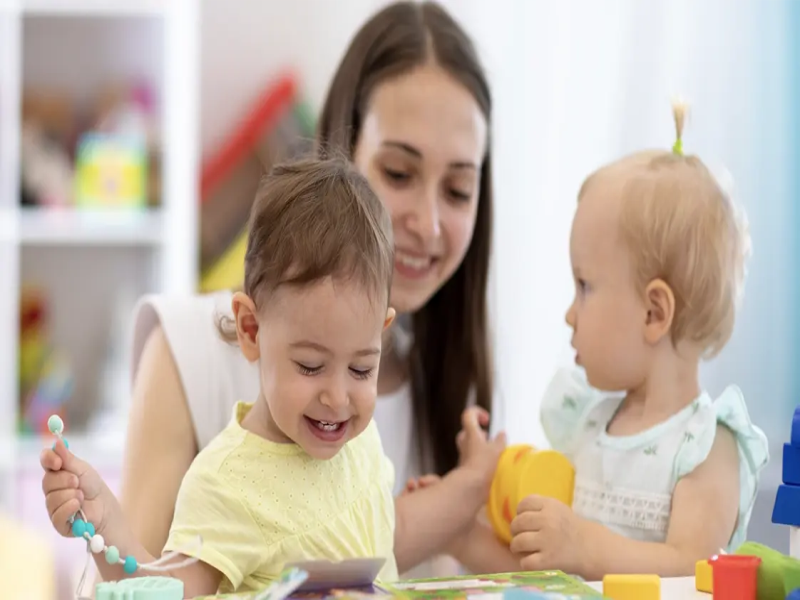It is the noblest and greatest privilege to be able to parent a child to be able to guide, teach, learn, and dedicate oneself to making that child a better person. However, it is a very challenging position for which can often cause stress, overwhelmed and, in some cases, even professional burnout. Everyone knows that being a parent is hard – constant job swapping, sleepless nights, and the emotional strain of child rearing no matter how strong willed one might be. However, amidst the chaos, there is a powerful tool that can help parents navigate these challenges and find a sense of calm and balance: mindfulness.
In this ultimate guide, readers will find extensive information on the practices of mindfulness aimed at reducing stress levels, with special emphasis on parents and the prevention of burnout. In the first article, we will explain what parental stress and burnout look like, and what modern research says about mindfulness as a method of reducing stress. First of all, parents become happier, more resilient, and more connected not only to themselves, but also to their families, when they have a practice of mindfulness.

Understanding Parental Stress and Burnout – Mindfulness for Stress Relief
Now it is important to briefly describe what parental stress and burnout are before we move to the topic of mindfulness. It also allows parents to identify these early features of those challenges and seek help and use preventive measures to adequately address their welfare.
What is Parental Stress?
Stress for parents is a normal experience that most parents undergo going by the numerous problems that surround the parenting process. It can be more defined as having the sense of stress or pressure or always feeling anxious. Several factors can contribute to parental stress, including:
- Sleep deprivation: The main considerations among parents and caregivers Is the fact that newborns and young children fidget during the night and wake up several times to result in fatigue.
- Financial worries: Housing costs, food, clothing, educational expenses or fees, and child care needs contribute to the significant stress most families suffer financially when bringing up children.
- Work-life balance challenges: The task of holding a job together with taking care of children and household chores feels pressuring and triggers guilty and incompetent emotions.
- Relationship strain: In addition, parenting is a stressful process that affects negatively the relations with the partner or other family members more frequently.
- Behavioral challenges in children: Dealing with such issues as tantrums, discipline issues or learning disabilities can be as wearing physically as it is emotionally draining on the parents.
What is Parental Burnout?
Parental burnout is a chronic exhaustion state or as a form of emotional exhaustion that is caused by an unmanaged parental stress. It is characterized by impairment of physical energy levels and an inability to derive pleasure from parenting particularly children. Symptoms of parental burnout may include:
- Emotional exhaustion: Intense stress, which characterizes by emotional exhaustion, loss of control or Response:_ cries that one cannot handle the challenges of parenthood.
- Detachment from children: Situations when one feels that he does not have much affection for one’s children, when one does not find pleasure in the company of one’s children.
- Sense of incompetence: Failing as a parent, questioning one’s competency, and loss of ones parental competency.
- Physical symptoms: Affected by physical symptoms that might include headache, stomach ache, fatigue, changes in appetite or sleep pattern.
The Impact of Parental Stress and Burnout on Families
Each kind of stress and burn out affects parents and their children in many ways and threatens the stability of the families.
- Strained parent-child relationships: Often when parents are stressed or burnt out that is probably one of the reasons they may end up being less patient, less attentive, and even less emotionally available to their children. It causes people to drift apart, do not share a special bond and can hardly be considered to be good friends.
- Increased family conflict: In presence of stress and instances of burn out, rivalry and tensions take place and the family loses its supportiveness.
- Negative impact on children’s well-being: Parents must learn that children are sensitive to their emotions or moods. This is bad tactics when parents are always stressed or have been burnt out, then it will have a bad effect on the kid’s emotional and behavioral development.
- Reduced overall family well-being: Besides, the above consequences, stress and burnouts resulting from parenting can go deeper in the family circle.
We must also be able to discuss the cause and recognition of stress and burnout in parents too. If parents take care of themselves and work to decrease stress they can better provide for their families and create happier households.
The Science Behind Mindfulness and Stress Reduction
Mindfulness is not just hype and in fact, more scientific work is accumulating that supports its utility in stress and well-being. Let’s take a closer look at how, functionally, mindfulness works and What is the mechanism through which it reduces stress?
What is Mindfulness?
There are a lot of ways to define mindfulness, yet the most common of them is defining it as the ability to focus on the current moment inclining towards curiosity and no criticism. It is simply knowing your thought processes, your emotions, and your physical response as they happen and not being dragged off into reactivity. Being mindful makes a person pay attention and accept things as they are and since this makes you to handle situations with calmness then it is of benefit to practice.
How does Mindfulness Help to Alleviate Stress?
Mindfulness works on multiple levels to reduce stress and promote well-being:
- Physiological Effects: Mindfulness mentality for example meditating and deep breathing belongs to positive psychology, and it has potential to activate the parasympathetic nerve, and as we know the parasympathetic nerve is most related to the rest and digest response. It works against the sympathetic nervous system which prepares the organism for the fight or flight response that increases heart rate, blood pressure and releases cortisol – the stress hormone.
- Psychological Effects: It is a way of watching oneself and learning from it; a method of regulating a person’s reactions to particular stimuli. Some of these may be feeling less anxious than before or being able to be able to manage the emotions better or even get a better control over what they think or feel.
- Neuroplasticity: Scholars together comprise the idea that mindfulness can help with neuroplasticity, which is the brain’s ability to change and adapt throughout one’s life span by creating new neural pathways within the brain. Sometimes, this may lead to closed or open head injury and changes in structure and function of the brain for the long term and gaining better ability to cope with stress and have better emotion health.
Research on Mindfulness and Parental Stress
Most empirical research done has shown that mindfulness has the potential of transforming the lives of parents by decreasing psychopathology and stress or even preventing parental burnout.
• According to findings from research done in the Journal of Applied Developmental Psychology, the Mindfulness training that was conducted was useful in decreasing the levels stress, anxiety and depression among the parents of children with ADHD.
• The other paper in Journal of Consulting and Clinical Psychology revealed that MBSR intervention resulted in positive changes in parenting effectiveness and stress levels among participants; and increase in well being.
• In Clinical Psychology Review, one meta-analysis of 19 research studies determined that mindfulness-based interventions are motivated in the decrease of parental stress and the enhancement of parenting resoluteness training for parents of children with ADHD led to significant reductions in parental stress, anxiety, and depression.
• Another study published in the Journal of Consulting and Clinical Psychology found that mindfulness-based stress reduction (MBSR) programs for parents led to improvements in parenting skills, decreased stress levels, and enhanced well-being.
• A meta-analysis of 19 studies published in the journal Clinical Psychology Review concluded that mindfulness interventions are effective in reducing parental stress and improving parenting outcomes.
These research finding assert the profound influence mindfulness can have on the health of parents and functioning of the family system. Having learned how mindfulness improves stress management strategies, personal strength for character development in parents and family unity in general, parents shall practice mindfulness.
In the next section, therefore, this paper will discuss some easy to practice mindfulness techniques that parents can apply in their daily lives to reduce stress levels and avoid burnout.
Practical Mindfulness Techniques for Parents
Now, let us explore specific noticing practices that could be easily translated into parents’ daily practice to use in order to minimize stress and avoid burnout.
Mindful Breathing
Breathing exercise is one that can be implemented, at any time or place, and is very helpful in reducing stress. It means there is a concentration of the mind, on the feeling of the breath going in and out of the body. This practice can be used to bring some level of control to our autonomic nervous system, take a moment to look at the kind of stress/anxiety level one is in and bring focus back.
- Relieves stress physically and mentally, on the human nervous system.
- Enhances attention Spano Fosters attitudes and feelings that enrich overall personality.
- Sit in a comfortable seat or better still, lie down.
- Lower your eyes or see them directed down or to the sides.
- Focus on your breathing, try to feel the air on your nostrils, the movement of your chest or abdomen.
- If your mind and thoughts wander you have to sit quietly and focus on your breath in a non-judgmental way.
- Continue for 5-10 minutes or for longer if you wish to.es that parents can easily incorporate into their lives to effectively manage stress and prevent burnout.
• Benefits of Mindful Breathing:
- Calms the nervous system, reducing the physical and emotional symptoms of stress
- Improves focus and concentration
- Enhances self-awareness and emotional regulation
• How to Practice Mindful Breathing:
- Find a comfortable seated position or lie down.
- Close your eyes or soften your gaze.
- Bring your attention to your breath, noticing the sensation of the air entering and leaving your nostrils or the rise and fall of your chest or abdomen.
- If your mind wanders, gently bring your attention back to your breath without judgment.
- Continue for 5-10 minutes or longer as desired.
It is best to practice mindful breathing at a turnaround time when you appear stressed, whenever you are taking a tea or coffee break, or before going to bed. It is as easy as ABC to do but very useful in helping one to focus and find some peace in whatever situation they may be.
Body Scan Meditation
Body scan meditation involves systematically bringing your attention to different parts of your body, noticing any sensations or feelings that arise without judgment. This practice helps to cultivate body awareness, release tension, and promote relaxation.
Benefits of Body Scan Meditation:
- Reduces physical tension and pain
- Promotes relaxation and stress reduction
- Enhances body awareness and connection to physical sensations
How to Practice Body Scan Meditation:
- Find a comfortable lying down position.
- Close your eyes and take a few deep breaths.
- Starting with your toes, slowly bring your attention to each part of your body, noticing any sensations you experience, such as warmth, coolness, tingling, or tightness.
- If your mind wanders, gently bring your attention back to your body without judgment.
- Continue scanning your body, moving from your toes to your head, spending a few moments with each body part.
- When you’re finished, take a few more deep breaths and slowly open your eyes.
There are lots of guided body scan meditations on YouTube or in any app related to mindfulness. Start that with five to ten minutes of meditation and gradually extend the time so you will be comfortable in doing mediation.
Mindful Walking
I believe the most effective way of making mindfulness a part of your daily life is through walking. The most crucial of all is a kind of consciousness known as ‘walking meditation’ added into the process of actual walking by paying attention to the feel of one’s own limbs moving and the soles of the feet touching the ground. Mindful breathing is best done when it seems like you’re stressed, every time you take tea or coffee break or before going to bed. As simple as ABC to do but helpful to the core for the individual to get bit of relief from all the circumstances they are into.
- Enhances student’s concentration on a particular subject.
- Improves proprioception and presence I am supposed to look for a place free from interferences in order to walk for a given distance.
- Start by; go for a brisk walk focusing on the feeling of your feet touching the floor/ground.
- Focus on your legs’ activity and the breathing pattern.
- Pay attention to the things around you by observing what you hear, the smell and the feel of things.
- If you get lost in your thoughts, don’t scold yourself, simply return to focus on your walking and how your body feels’ body awareness and connection to the present moment
How to Practice Mindful Walking:
- Find a quiet place where you can walk without distractions.
- Begin by walking at a comfortable pace, noticing the sensation of your feet making contact with the ground.
- Pay attention to the movement of your legs and the rhythm of your breath.
- Notice the sights, sounds, and smells around you, engaging your senses in the present moment.
- If your mind wanders, gently bring your attention back to your walking and the sensations in your body.
Mindful walking can be done as little as 5-10 minutes to pudding or as a part of a regular walk to work or gym. It is a perfect way to introduce addition of mindfulness to your daily life and feel the advantages of engaging a human’s presence into his or her body and environment.
Let’s move on to the next mindfulness technique: mindful eating.
Mindful Eating
The way people eat is quite unappreciative and random most of the time, people eat while doing other things or simply eaten hurriedly. However, mindful eating compels one to take a break from the crazed cycle of hustling, barely chewing absorbedly and really tasting the food in front of the consumer.
- Enhances the rate of taking meals and assimilation of food substances.
- Promotes improved choices on what to eat or what not to eat as well as portions to be taken
- Promotes Screwing culinary experience and satisfaction.
- Minimizes stress levels and lowers the act of eating due to stress. done while multitasking or rushing through meals. However, mindful eating encourages us to slow down, savor each bite, and fully experience the nourishment and pleasure of food.
Benefits of Mindful Eating:
- Improves digestion and nutrient absorption
- Promotes healthier eating habits and portion control
- Enhances enjoyment and appreciation of food
- Reduces stress and emotional eating
How to Practice Mindful Eating:
- Minimize distractions: Will provide a quiet environment where no device such as TVs and radios when eating but they should be switched off.
- Engage your senses: If you’re eating, pay attention to the hue, touch, smell and taste of the food you’re consuming.
- Take small bites and chew slowly: Chew slowly and think about what you are eating, their tastes and how it feels in your mouth.
- Put your utensils down between bites: This enables you keep off excessive food intake and as a result lose some weight.
- Listen to your body’s hunger and fullness cues: Adopt a diet that you take food and get to a point where you have had enough.
Mindful eating can be practiced at any meal or snack. By paying full attention to the experience of eating, you can cultivate a healthier relationship with food, reduce stress, and enhance your overall well-being.
Mindful Parenting
Thus, although undertaking family life is one of the noble goals in human life, it is one of the hardest things people encounter. Mindful parenting fully refers to the use of mindfulness in the treatment or interaction with children. It therefore fosters attachment, understanding and soothing not only between parents and children but also between any other person.
- Enhance parent child relations Lowers levels of parental stress and reactivity.
- Promotes positive quality parent-child relationships
- Fosters empathy and compassion it Enhances child well being joy, but it can also be incredibly challenging. Mindful parenting involves bringing present-moment awareness and non-judgmental acceptance to your interactions with your children. This approach fosters connection, understanding, and emotional regulation, benefiting both parents and children.
Benefits of Mindful Parenting:
- Improves parent-child relationships
- Reduces parental stress and reactivity
- Enhances emotional regulation in both parents and children
- Fosters empathy and compassion
- Promotes positive child development
How to Practice Mindful Parenting:
- Be fully present with your children: Stop all the other activities and focus on your gift.
- Listen actively to their concerns and feelings: Help them understand that emotions are their problems have a right to be there and you are there to help.
- Respond with patience and understanding: Do not respond emotionally or with anger in your statements. Chill out and pick your expressions wisely.
- Set clear boundaries and expectations: Never beat around the bush when it comes to self-assertion in a loving partnership, but do not be too specific when it comes to restraining expectations.
- Practice self-compassion: Accept that parenting is as stressful as it is and do not beat yourself up when you are not at your best.
Applying mindfulness into the way you raise your kids, gives you a way of giving the best to your kids and at the same time lessening your stress, and improving your health.
Since we’ve looked at some ways on how to practice mindfulness, let’s go on and talk about how you can establish mindfulness into your daily routine when you are in a parenting role.

Integrating Mindfulness into Daily Life
For mindfulness to be most effective it is best if it is incorporated into our daily practices. The time spent during such break is considered valuable and as a result used to improve and supplement the daily practice and interactions so that one can always be in the present moments. Here is a list of the best tips, which may help you to improve mindfulness in your life as a parent.
How to build a mindful morning regimen
Busy can best describe mornings, as everyone wakes up, tries to get everyone ready and ensure they all go out. Meanwhile, practicing a contemplative morning schedule tends to act as the signal of positive expectation of the day’s eventfulness and helps manage problems effectively.
- Mindful Meditation or Breathing: Try to allocate at least some time every morning for some praying, or for some breathing exercises. Sit down comfortably, relax your body, and feel your breath or the words of your prayer. Spare 5-10 minutes of your day for meditation and you will sure that your emotional state will be calmer and you will be more productive throughout the day.
- Mindful Movement: You should make functional flexibility either through performing stretches or displaying yoga movements in the morning. Pressure, for instance, is a good way to expel the stress and anxiety, enhance the flow of blood and augment concentration and focus.
- Gratitude Practice: Before starting your day try to think of a few things you are thankful for. This might mean jotting down in a thankful journal, or telling members of your family about things you are thankful for, or even pausing for five minutes and just by yourself thinking about the good things in your life.
- Mindful Breakfast: It’s important to make your breakfast a relaxing, conscious affair in contrast to gulping it down whilst checking your phone or responding to emails. Do not underestimate few tips on how to do it •Put emphasis on the taste, form, smell, and temperature of the food you consume. This may assist you in attaining a sense of steadiness in your body to try and establish presence, as you enter your day.
Mindful Breaks Throughout the Day
However, it is recommended to take five to 10 minutes for a break and an act of presence irrespective of the daily schedule. As such, those brief moments of mindfulness can be beneficial to refresh you, reduce stress, or realign your thoughts.
- Mindful Breathing at Your Desk: If you are having a stressful day or maybe even at work, spend a couple of minutes practicing deep breathing at your workplace. To do this, breathe in fresh air, and while doing that tell yourself to feel your breathing and the air moving in and out of your lungs.
- Mindful Walking or Stretching: If you get a break of 5 or 10 minutes, go for a mindful walk or do some stretching exercises at your work station. Focus on the feelings in your body and to the surroundings.
- Mindful Observation: Spend a few moments and try not to make judgments about the environment around you. Finally, pay attention to surroundings, to the noises, the odors, and the light and dark. It will free you from unconstructive thinking trap and offers a way to improve your present-moment focus.
- Mindfulness Apps: Other forms of relaxation are through contemplation and breathing – this can be through the apps in the smart phones that could offer guided contemplation and other forms of awareness and self- mindfulness. There is nothing wrong if one would like to do a little mindfulness exercise while on the move or when taking a five minutes break.
Mindful Bedtime Routine
Hence, creating knowledge about a correct set of exercises or activities to lead to improved sleep has a strong potential idea.
- Digital Detox: Suspend electronic gadgets at least an hour to bed to eliminate effects of light blue that hampers sleep.
- Reading or Journaling: One should spend about thirty minutes to an hour reading a book or simply writing a journal. This can prove useful to you in helping you let go of whatever thoughts that are in your mind and put yourself at ease.
- Gratitude Practice: Focus on the pleasant moments of your day and imagine that every life experience and person you know is worth your appreciation. It can help create a feeling of happiness, and even joy as we let go of conscious thought and slip into slumber.
- Gentle Yoga or Stretching: Do easy exercise that might be associated with yoga or stretching so as to ease stress of the body and prepare the body for sleeping.
- Mindful Breathing or Meditation: Take a few minutes of deep breathing or meditation in order to help your brain and body get ready for sleep.
When you set a bedtime goal, and stick to it, you will realize that you are not only getting a better night’s sleep but are also less stressed and more alert in the morning.
Mindfulness Apps and Resources
At the present time, there are many high-quality mindfulness applications & other resources they can use as parents desiring to attain stress relief & wellbeing. They offer nuts and bolts of meditation and how to practice mindfulness, breathing exercises, and much more other features and supports that can be used anytime of the day.
Popular Mindfulness Apps:
- Headspace: It has tracking and analysis of your mindfulness level, including different guided meditations, related exercises, and sleep support for newcomers and the most experienced persons.
- Calm: Calm offers hundreds of guided meditations for stress, anxiety, and sleep; sleep stories; and restful music for relaxation.
- Insight Timer: Over 500 guided meditations, talks and music are offered for free and are provided from various teachers of different traditions which help you to make a choice and achieve mindfulness.
- Smiling Mind: The programs given in this app are mindfulness programs suited for children, adolescents as well as adults. This makes it a haven for families who want to learn how to practice mindfulness as a family.
Other Resources:
- Books and Articles: There are many books and articles available on mindfulness, which help a reader obtain profound information and guidance on different approaches towards mindfulness, as well as diverse techniques.
- Mindfulness Workshops and Retreats: Something else that can be recommended here is learning mindfulness, or going to workshops or, if possible, even to a retreat.
- Online Communities and Forums: There are pages for Mindfulness on the various social platforms where one gets associates with other people who are also practicing them, seek counsel or even share with.
These resources can be useful for you and help to find all necessary information and support in the path of mindfulness. Choosing application or any resource, one has to take a chance and search for the application, which could react to the tasks and conditionality, and which could be integrated into the daily routine. Habit, important when it comes to mindfulness practice, is a key factor to enjoying the full fruits of practice.
Additional Tips for Managing Parental Stress
However, mindfulness is just one of the ways that can help parents to reduce their stress and burnout level. Here are few more insights to address just the practical aspects of parenting and how to keep up in dealing with your children.
Self-Compassion
Child rearing is a daunting and indeed a Herculean task. One way is to try to implement more self-acceptance as a person may need to remind themselves that is okay not to always be perfect. Keep yourself and your mind open to forgiveness and then be forgiving to yourself when you are not perfect.
Setting Boundaries
Commitment and saying no are good things in the workplace you should learn so that you do not get into the pit of despair due to overworking. Assuming too much and overextending your self will be detrimental to you. Thus, regard yourself first and do not say that you are out of stamina and do not shy away from asking someone to assist you or else.
Seeking Support
Being parents is sometimes can be so lonely and demanding, but know that you are never alone. For one to get himself/her self in such a situation, it is always advisable to consult friends, family or lecturers. Telling someone who understands these bumps and grinds relieves pressure on your own feelings and thoughts and can actually give informative, wise counsel.
Regularity and Healthy Dieting
Sleeping well and consuming well balanced diets is very essential both physically and mentally. Check that you’re getting enough sleep and eating right for your body type. Do not consume energy from caffeine or sugar as they cause crashes and increase stress.
More specifically it is important to point out that people need to find time for fun and relaxation.
When you have children, staying busy is par for the course, so don’t be too hard on yourself when you realize you haven’t made much time for fun. Take up a new leisure interest, go out with friends, listen to music or watch a good movie on television. Products, services, and passion are critical outcomes of taking breaks and enjoying life since it reduces stress levels and helps with balancing work.
You can thus adopt the above tips outside practicing mindfulness to come up with the best solution and relief for parental stress and burnout. Keep in mind, it is okay to take care of yourself; in fact it is mandatory for being a good parent.

Conclusion – Mindfulness for Stress Relief
Some more difficulties include parental stress and even burnout however this is not a rule and does not have to be for you. This guide introduces techniques that will help you and your family generate more inner peace and mental strength.
For further reminder, mindfulness is a process and it does not have an ultimate end point. The ability requires regular effort, practice, and some level of perseverance in order to build up the ability to practice mindfulness on a regular basis. The benefits are tremendous, lowers stress levels, causes increased health for all connected, and tight knit families.
So, start today. Breathe in, look forward to owning a mindful lifestyle with your family members and let’s get started. Therefore not only will you learn how to be one of the happiest parents possible but also contribute to your children’s success as happy individuals, striving for a life full of positive emotions and proper spiritual state.







